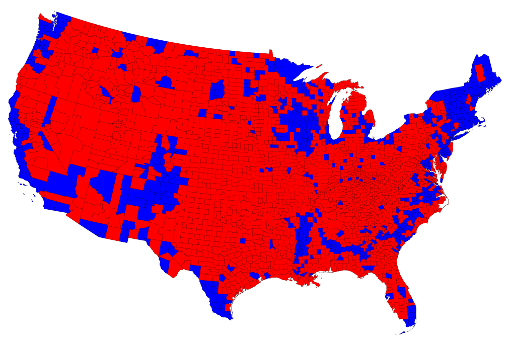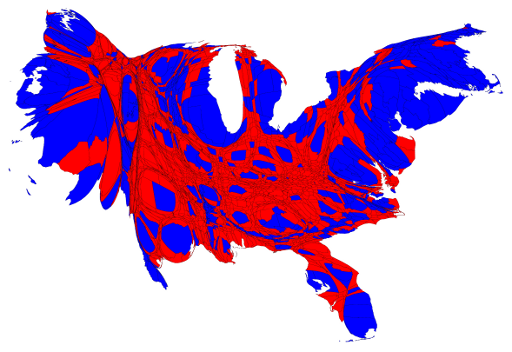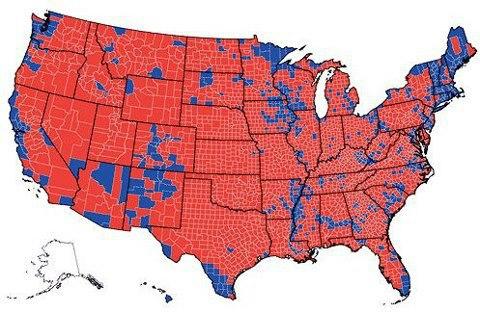Rural areas were over-privileged and now they’re not, so now they’re disenfranchised.
This seems to be the gist of Marc Comtois’ Anchor Rising post lamenting the rise of the one-person/one-vote system that helped end centuries of disenfranchisement of urban, nonwhite, poor voters. Marc even has a handy map of the counties of the United States and how they voted.
Except there’s a problem. That map is at least 12 years old. Snopes even has a thread for it, which is the leading Google Image result I found searching “2012 election by county”. Here’s Mr. Comtois’s selected map:
For comparison, here’s a county-level map created by Mark Newman at the University of Michigan:
 Many more swathes of blue. Of course, land can’t vote, people do, so if you create a cartogram; a map of the United states based on population by county (which Mr. Newman has):
Many more swathes of blue. Of course, land can’t vote, people do, so if you create a cartogram; a map of the United states based on population by county (which Mr. Newman has):
 I could go on like this, by Mr. Newman really has done it all already, so I suggest clicking the link above and reading it. All of that is to look at Mr. Comtois’ point: that rural communities’ interests are being subjugated to the demands of the urban/suburban citizens by dint of those areas having larger populations. Mr. Comtois points out that Rhode Island’s Bloodless Revolution ended a system of having senators represent towns and cities instead of districts, essentially creating a smaller version of the House of Representatives.
I could go on like this, by Mr. Newman really has done it all already, so I suggest clicking the link above and reading it. All of that is to look at Mr. Comtois’ point: that rural communities’ interests are being subjugated to the demands of the urban/suburban citizens by dint of those areas having larger populations. Mr. Comtois points out that Rhode Island’s Bloodless Revolution ended a system of having senators represent towns and cities instead of districts, essentially creating a smaller version of the House of Representatives.
He’s right on that score. But he’s conveniently ignored the history that made taking control of the Senate so vital; as Republican control of the state had slipped away, Republicans had placed more and more power in the Senate, making the Governor’s office largely ceremonial. Modern Republicans decry Democratic politics as machine politics, but Rhode Island Democrats learned their trade at the hands of Republicans, who so corruptly ran this state that they earned us the famous “a state for sale, and cheap” quote that haunts Rhode Island politics to this day.
Rhode Island’s history is filled with rural communities actively disenfranchising urban communities; rural communities tend to be filled with landholders while urban communities tend to be filled with renters. Rural areas are whiter and of greater Yankee stock; urban areas tend to be less white and of immigrant backgrounds. Thus property requirements for voting enfranchised rural voters while disenfranchising urban voters. It took direct actions like the Dorr Rebellion and tricks of parliamentary procedure like the Bloodless Revolution to finally end that.
Losing the over-representation that rural communities had, almost always at the expense of the poor, urban, and immigrant doesn’t equate to disenfranchisement. It’s equality. Republicans appear to be having issues with that; for instance, the U.S. House of Representatives is so disproportionate thanks to the redistricting process that Democratic House candidates actually won more votes than Republican House candidates. By virtue of living in a Republican district, your vote was worth more. The U.S. Congress is currently apportioned to favor the rural voter over the urban voter. That Rhode Island’s government doesn’t follow suit is a good thing.


